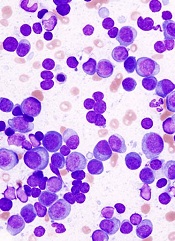
VIENNA—Combination therapy consisting of the HDAC6 inhibitor ricolinostat, pomalidomide, and dexamethasone can provide a clinical benefit for patients with relapsed and refractory multiple myeloma (MM), according to a researchers.
In a phase 1b/2 trial, the triplet produced an overall response rate (ORR) of 29% and a clinical benefit rate of 50%.
The most common treatment-related adverse events were fatigue, diarrhea, and neutropenia.
“As a physician, it is encouraging to see patients whose multiple myeloma has progressed while receiving standard-of-care therapy achieve clinical benefit with the combination of ricolinostat, [pomalidomide], and dexamethasone,” said study investigator Noopur Raje, MD, of the Massachusetts General Hospital Cancer Center in Boston.
Dr Raje and her colleagues presented results with this combination at the 20th Congress of the European Hematology Association (abstract P279*). The research was sponsored by Acetylon Pharmaceuticals, Inc., the company developing ricolinostat.
The phase 1b portion of this trial was a 3+3 design in which ricolinostat (160 mg) was given once daily (QD) or twice daily (BID) along with pomalidomide (4 mg) for 21 days of a 28-day cycle with dexamethasone (40 mg) on days 1, 8, 15, and 22. Seven patients were treated in the phase 1b portion, with 3 at 160 mg QD and 4 at 160 mg BID.
In the ongoing phase 2 portion of the study, 32 patients were enrolled as of April 27, 2015, and 28 of these patients were evaluable for response. Nineteen of the patients received ricolinostat at 160 mg QD, and 9 received the drug at 160 mg BID.
The median age for all 39 patients was 68 (range, 48-80), and they had received a median of 3 prior therapies (range, 2-5). Seventy-four percent of patients were refractory to lenalidomide, 59% to bortezomib, and 38% to both drugs.
Treatment results
At a median follow-up of 12 weeks, the ORR among the 28 evaluable phase 2 patients was 29%. Clinical benefit, defined as minimal response or greater, was 50%.
Three patients had a very good partial response, 5 had a partial response, 6 had a minimal response, 5 had stable disease, 3 progressed, and 6 had an unconfirmed response at the time of data cutoff.
All 7 patients in the phase 1b portion of the study had discontinued treatment due to progressive disease.
Of the 28 evaluable patients in the phase 2 portion, 57% (n=16) remained on the study after a median of 3 months on therapy. The other 43% discontinued treatment due to progressive disease (n=6), a non-fatal adverse event (n=3), patient decision (n=2), or investigator decision (n=1).
The researchers said the optimal dose and schedule for ricolinostat in combination with pomalidomide and dexamethasone was 160 mg QD on days 1-21 of a 28-day cycle. Patients treated at this dose experienced no dose-limiting toxicities. At 160 mg BID, some clinically relevant grade 2 diarrhea was observed.
In all 39 patients, the common treatment-emergent adverse events were fatigue (41%), diarrhea (38%), neutropenia (36%), anemia (31%), a decrease in platelet count (26%), constipation (21%), hypertension (18%), hyponatremia (18%), upper respiratory tract infection (15%), and a decrease in white cell count (15%).
Grade 3 and 4 adverse events, apart from neutropenia (26%), were uncommon (occurring in 8% of patients or fewer).
Grade 3/4 adverse events considered possibly related to ricolinostat included neutropenia (n=5), diarrhea (n=3), bronchitis (n=1), anemia (n=1), chronic cardiac failure (n=1), leukopenia (n=1), lymphopenia (n=1), pneumonia (n=1), increased alanine aminotransferase (n=1), fatigue (n=1), thrombocytopenia (n=1), and renal failure (n=1).
“This all-oral combination has been very well-tolerated,” Dr Raje said, “making it potentially suitable for treatment of a broad range of patients, including older patients, patients for whom a non-oral drug regimen is limiting, and potentially as a part of an all-oral maintenance regimen.”

*Information in the abstract differs from that presented at the meeting.

